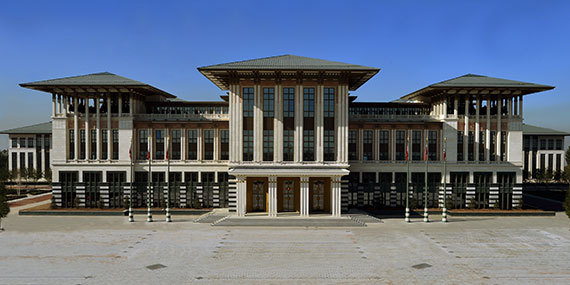Turkish ruling party AKP announced this week that a shift to the presidential system will be its top electoral agenda. The party, which has ruled more than any other party in Turkish history, is bracing to solicit votes for upcoming parliamentary elections with a promise that the country will be better shaped if led by a president with more executive powers.
In almost every day, President Recep Tayyip Erdogan, his cronies and the media close to him lecture the benefits of the presidential system. Erdogan claims that the presidential system will catapult Turkey into a set of advanced industrial nations and make the country even more sovereign.
For critics, Erdogan's push for the presidential system is fashioned in line with his ambition for more power. The day he became the president last year, a new sumptuous palace was ready at his disposal. He also purchased a luxurious plane and claimed that he won't "waste time with connecting flights and delays" (As if he is using commercial airliners). Similar lavish spending partially consumed Erdogan's credibility that he wants presidential system for the sake of country's political stability rather than for himself. But his electorate is yet to wake up.
There is still a significant portion of the society who thinks the presidential system will be immune to the type of political turmoil the country had gone through in 1990s. For Erdogan's fan base, the presidential system is an answer to the fear of political instability - a sleeping monster.
Turkish public is probably unaware of the risk of shifting a parliamentary semi-democracy to a super presidential system without functioning checks. Given Erdogan's authoritarian proclivities, a presidential system without proper institutional mechanisms that could hold the presidential power accountable is a sure path to a room of trouble. Only few countries in the world could sustain its democracy with a super-presidential system.
There are currently 70 presidential and semi-presidential republics and six states ruled by presidents. Out of these countries, only four countries, France, Portugal, Chile and the US, have full consolidated democracies, according to the latest Freedom House ranking.
Other democracies such as Brazil, Indonesia, Mexico, Philippines, Georgia and Ukraine have a troubled history of democracy and their political systems are still vulnerable to authoritarian leaders. Only Cyprus, Romania and South Korea seem to be close to a consolidated democracy.
To be precise, a presidential system with meaningful and functioning checks and balances is not a threat to democracy. France and the US are chief examples. But in countries where democracy has serious shortcomings, presidential system makes it even harder to move forward in protecting rights and improving freedoms.
In almost every electoral season, Erdogan garnered support by recalling unstable and incompetent coalition governments that ruled Turkey in 1990s - nightmare for conservative people. Erdogan asked people to repeatedly vote for his party because what Turkey needed was a stable government. Erdogan wants to build up on this momentum by proposing a shift to the presidential system.
For this reason, Turkey's opposition parties have a challenging task of convincing the public that the presidential system might not be the antidote to the country's long-running woes. For Turkey's conservative electorate, stability is preferable to a system that guarantees rights and freedoms. Turkish opposition offers people democracy, not stability.
Instead of totally rejecting the presidential system, which Erdogan proposed as a cure to chronic political instability, the opposition could offer a better way to deal with the possible political chaos: winner-takes-all electoral system.
Turkey needs to change its electoral system from the current proportional system into a winner-takes-all plurality voting to preserve a long-term stability and ensure functioning democracy.
According to Maurice Duverger, a trailblazing political scientist who wrote about electoral systems in 1950s, countries with majoritarian electoral systems tend to have two-party systems while countries with party lists have multi-party systems.
According to the principle, also called as the "Duverger Law," people punish weak parties by voting for either of two front-runners to avoid wasting their votes. With this system, every citizen casts one vote for a single candidate for a single legislative seat and electorates "think twice" to avoid wasting their votes and support candidates who are close to win the seat. Weaker parties either fade away or join blocs to defeat a much stronger adversary. In most cases, plurality voting tend to create two-party and stable political systems. The US and UK are prime examples. Proportional electoral systems, however, create multi-party systems and coalition governments, much like as it was in Turkey. In Britain, political parties rarely form government coalitions and the system is rightly described as 2+1. Because the parliamentary system is so vibrant and the democratic culture is so prevalent that the governments don't resort to authoritarian measures. In the US, checks and balances are designed in such a way that government gridlock has already become a routine political scenario.
The majoritarian system will not knock Kurds out of the political scene in Turkey, because most Kurds live in geographically compact provinces. The system is harmful for parties whose representation is thinly scattered across large areas. Kurdish representation do not have a similar risk.
Britain and the US are two examples of political stability where majoritarian electoral system created two-party systems. In Turkey, the same system could be built without resorting to the presidential system. By offering to change the electoral system, Turkish opposition will promise a stable future for the people while preserving the parliamentary democracy.

